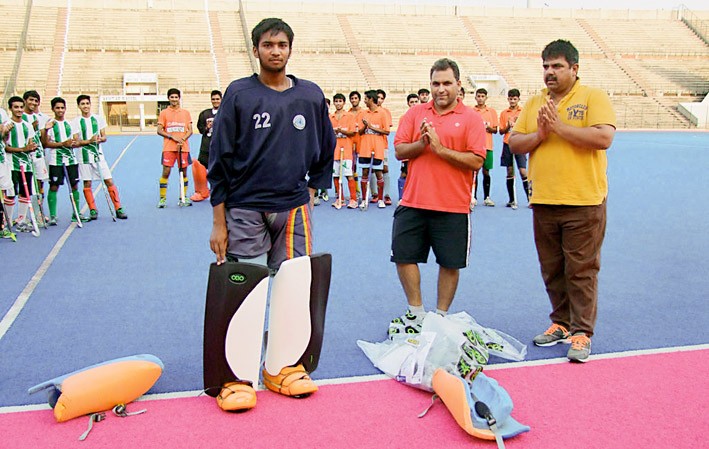

Dar Hockey Academy is perhaps the best organised, the most resourceful and the biggest reservoir of polished hockey talent in the country at the moment.
Founded in late 2006, the academy has shown an upward graph throughout. In 2009, its boys won the first national junior selection; since then every Pakistani age group side has had some representation from the academy.
In 2012, the first national senior selection was gained; so far four have donned the green blazer.
The dynamic management of Taqueer Dar, the founding president, has enabled the academy to make four training tours of Europe since 2010 during which it played against teams in major hockey countries: the Netherlands, Germany and Belgium. It also won a junior tournament in India a few years back.
Hence, it was no surprise that the Dar HA boys were in abundance at this year’s national championship in Karachi: 20 teams were in the fray, 15 departmental, four provincial and one from Islamabad.
No less than 12 of the 15 departmental sides included Dar HA boys; 27 of them. These included all the four semi-finalists: PIA, WAPDA, National Bank and Army.
Only one of the losing quarter-finalist teams did not have a Dar HA boy on its rolls. Such was the demand.
The academy is based in Lahore and a vast majority of the boys hail from Punjab. It must be mentioned that the academy provides free board and lodging as well as schooling to the outstation boys. Therefore, it was shocking to see Punjab team selectors not naming any academy player in the provincial outfit for these nationals. The Punjab team suffered for this omission. It failed to win any match and finished at the bottom of the pool. Punjab even lost to Khyber Pakhtunkhwa, the other provincial outfit in the pool.
The final, the two semis and the third position game were the most closely fought contests. These four sides had nine Dar HA boys playing for them.
All this leads to a very logical proposition. What about having a Dar Academy team in the nationals?
This would have many positives. The morale of the Dar HA boys and management would go sky high. The academy is being run through private sponsors without any help from the government or the hockey federation. With the Dar HA figuring in the national championships, not only the current patrons would be more forthcoming but new sponsors would also get interested.
The detractors might say that there is no provision in the PHF rules to give playing rights to a private academy.
These are exceptional times for Pakistan hockey. Out of the Olympics, out of the World Cup, out of favour with the sponsors, out of favour with general public… the list goes on and on. Special times require out of the box measures.
It could turn out to be a revolutionary step. The presence of the Dar HA at the nationals would set an example and encourage other private academies and clubs to raise their standards so as to be eligible for the same privilege.
At least one club can also claim similar rights. Pakistan’s junior national teams which appeared in the Junior Asia Cup and Sultan of Johor Cup a few months back had no less than six players from ‘Gojra Sports’. This club, founded by late Ustad Aslam Roda, though not as resourceful as the Dar HA, along with Iqbal Bali’s ‘The Gojra Club’ has provided a number of players to Pakistan teams over the last three decades.
Hockey has become the identity of the small tehsil town of Gojra in district Toba Tek Singh. Interestingly, some Gojra boys are with the Dar HA as well.
Playing rights for private academies and clubs could help nurture the same club culture in Pakistan which is prevalent in all the top hockey countries. There club teams play in the national leagues rather than departments or regions.
As the academy and club players practise among themselves almost all the year round, they are well-knitted sides with greater understanding among the team members than regional sides which are selected just before major tournaments mostly after one-day trials. Even the departmental teams assemble only on the eve of big events.
If given the opportunity, which they fully deserve, the Dar HA and Gojra Sports will surely do well on the national circuit.
An example already exists across the border. OTHL (One Thousand Hockey Legs) was initiated in India by an NGO, the Hockey Citizen Group, led by noted hockey journalist and historian K Arumugam in 2008. So far, they have introduced about 2,400 children to the sport with the aim of providing them an opportunity to understand and play hockey.
Like the Dar HA, the OTHL is also funded by businesses and children are provided equipment and coaching free of cost. Their boys have played for the state teams but are yet to win selection for the national junior team. Yet, the Hockey India appreciated the initiative and granted affiliation to the OTHL in 2014. This has resulted in OTHL’s participation in India’s national junior championships.
The Dar Academy has even stronger credentials. It is rendering great service to Pakistan hockey by providing polished guys to Pakistan’s national teams, senior as well as age group.
If the PHF earnestly desires to put Pakistan hockey on the right track then such steps are very much required.